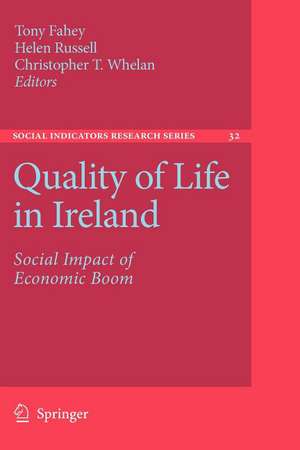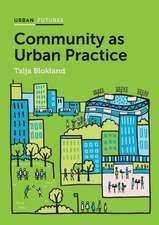Quality of Life in Ireland: Social Impact of Economic Boom: Social Indicators Research Series, cartea 32
Editat de Tony Fahey, Helen Russell, Christopher T. Whelanen Limba Engleză Paperback – 30 noi 2010
| Toate formatele și edițiile | Preț | Express |
|---|---|---|
| Paperback (1) | 1218.53 lei 6-8 săpt. | |
| SPRINGER NETHERLANDS – 30 noi 2010 | 1218.53 lei 6-8 săpt. | |
| Hardback (1) | 1224.54 lei 6-8 săpt. | |
| SPRINGER NETHERLANDS – 26 aug 2008 | 1224.54 lei 6-8 săpt. |
Din seria Social Indicators Research Series
- 15%
 Preț: 601.13 lei
Preț: 601.13 lei - 5%
 Preț: 861.64 lei
Preț: 861.64 lei - 18%
 Preț: 945.47 lei
Preț: 945.47 lei - 15%
 Preț: 644.30 lei
Preț: 644.30 lei - 18%
 Preț: 959.50 lei
Preț: 959.50 lei - 15%
 Preț: 645.60 lei
Preț: 645.60 lei - 18%
 Preț: 1234.94 lei
Preț: 1234.94 lei - 15%
 Preț: 640.06 lei
Preț: 640.06 lei - 15%
 Preț: 635.47 lei
Preț: 635.47 lei - 5%
 Preț: 1105.21 lei
Preț: 1105.21 lei - 15%
 Preț: 646.11 lei
Preț: 646.11 lei - 18%
 Preț: 1233.06 lei
Preț: 1233.06 lei - 18%
 Preț: 953.03 lei
Preț: 953.03 lei - 5%
 Preț: 1101.37 lei
Preț: 1101.37 lei - 15%
 Preț: 644.82 lei
Preț: 644.82 lei - 18%
 Preț: 948.92 lei
Preț: 948.92 lei - 15%
 Preț: 642.51 lei
Preț: 642.51 lei - 18%
 Preț: 954.45 lei
Preț: 954.45 lei - 18%
 Preț: 1235.76 lei
Preț: 1235.76 lei -
 Preț: 407.56 lei
Preț: 407.56 lei - 15%
 Preț: 642.83 lei
Preț: 642.83 lei - 18%
 Preț: 955.70 lei
Preț: 955.70 lei - 15%
 Preț: 644.49 lei
Preț: 644.49 lei - 18%
 Preț: 952.89 lei
Preț: 952.89 lei - 15%
 Preț: 648.89 lei
Preț: 648.89 lei - 15%
 Preț: 645.47 lei
Preț: 645.47 lei - 18%
 Preț: 1224.54 lei
Preț: 1224.54 lei
Preț: 1218.53 lei
Preț vechi: 1486.00 lei
-18% Nou
Puncte Express: 1828
Preț estimativ în valută:
233.16€ • 243.44$ • 192.97£
233.16€ • 243.44$ • 192.97£
Carte tipărită la comandă
Livrare economică 04-18 aprilie
Preluare comenzi: 021 569.72.76
Specificații
ISBN-13: 9789048177820
ISBN-10: 9048177820
Pagini: 332
Ilustrații: XIII, 316 p.
Dimensiuni: 155 x 235 x 17 mm
Greutate: 0.47 kg
Ediția:Softcover reprint of hardcover 1st ed. 2007
Editura: SPRINGER NETHERLANDS
Colecția Springer
Seria Social Indicators Research Series
Locul publicării:Dordrecht, Netherlands
ISBN-10: 9048177820
Pagini: 332
Ilustrații: XIII, 316 p.
Dimensiuni: 155 x 235 x 17 mm
Greutate: 0.47 kg
Ediția:Softcover reprint of hardcover 1st ed. 2007
Editura: SPRINGER NETHERLANDS
Colecția Springer
Seria Social Indicators Research Series
Locul publicării:Dordrecht, Netherlands
Public țintă
ResearchCuprins
Quality of Life After the Boom.- How Do We Feel? Economic Boom and Happiness.- Economic Growth and Income Inequality: Setting the Context.- Employment and the Quality of Work.- Opportunities for All in the New Ireland?.- Consistent Poverty and Economic Vulnerability.- Health and Health Care.- The Housing Boom.- Changing Times, Changing Schools? Quality of Life for Students.- Family and Sexuality.- Ties that Bind? The Social Fabric of Daily Life in New Suburbs.- Gender, Work–Life Balance and Quality of Life.- The Impact of Immigration.- Crime and its Consequences.- Soaring in the Best of Times?.
Textul de pe ultima copertă
The Irish economic boom has caused the economy in Ireland to roar ahead, but what has it done to Irish society? Some see the rising tide as having lifted all boats, while others argue that the benefits have accrued mostly to those who were already well placed. Some highlight how economic growth has raised living standards, while others say that it has imposed strains on family life, eroded values and communities, and created problems in accessing adequate housing, health care and other services.
So, are we in Ireland now living in ‘the best of times’, or has increased prosperity come at (too high) a cost? And can the rest of the world draw any lessons from what has happened in Ireland? The purpose of this book, which contains a collection of chapters written by some of Ireland’s leading social researchers, is to bring to bear the latest research and empirical evidence to answer these questions. It is aimed at a general audience and seeks to contribute to public debate in Ireland and abroad, while at the same time striving for rigorous, evidence-based argument.
The overall judgment offered by the book is positive, though with qualifications. Ireland still has problems: social inequalities are slow to narrow; the indignities of poverty and hopelessness, though less widespread than before, are still too common; some public services are poor; and traffic congestion frays the nerves. But there is a long list of social fundamentals that are stronger today than before the economic boom arrived.
National moral is among the highest in Europe, most people’s economic circumstances have greatly improved, jobs are astonishingly abundant, people are now flocking into the country rather than out of it, and they are marrying and having children at a higher rate than fifteen years ago.
These are only some of the positives identified in the book. Together they suggest that even on social grounds the Irisheconomic boom deserves at least two cheers, even if it has far from succeeded in solving all social ills.
So, are we in Ireland now living in ‘the best of times’, or has increased prosperity come at (too high) a cost? And can the rest of the world draw any lessons from what has happened in Ireland? The purpose of this book, which contains a collection of chapters written by some of Ireland’s leading social researchers, is to bring to bear the latest research and empirical evidence to answer these questions. It is aimed at a general audience and seeks to contribute to public debate in Ireland and abroad, while at the same time striving for rigorous, evidence-based argument.
The overall judgment offered by the book is positive, though with qualifications. Ireland still has problems: social inequalities are slow to narrow; the indignities of poverty and hopelessness, though less widespread than before, are still too common; some public services are poor; and traffic congestion frays the nerves. But there is a long list of social fundamentals that are stronger today than before the economic boom arrived.
National moral is among the highest in Europe, most people’s economic circumstances have greatly improved, jobs are astonishingly abundant, people are now flocking into the country rather than out of it, and they are marrying and having children at a higher rate than fifteen years ago.
These are only some of the positives identified in the book. Together they suggest that even on social grounds the Irisheconomic boom deserves at least two cheers, even if it has far from succeeded in solving all social ills.
Caracteristici
Presents and assesses the latest findings on the social impact of economic changes in Ireland since the early 1990's Shows that the Celtic Tiger has brought important social gains and economic growth Ireland: now living in “Best of Times”, or has increased prosperity come at (too) high cost?








